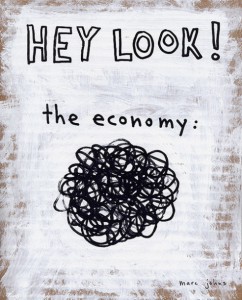(Last week I represented AEGEE-Europe in a social hearing on Social Innovation. Here is some food for thought as the outcome of couple of hours spent there.)
Governments, academics, private sectors, they are all trying to survive and solve this infamous ‘times of crisis’. But there doesn’t seem to be any progress. Although politicians are trying to convince us with some exaggerated hopes, the society does not seem to be satisfied. At this point, a question with three letters either has stroke you already or will get you soon: Why?
Ironically, the economical crisis was proven to be useful for a case. They officially confirmed the need for a change in our approaches to solve problems. They showed that conventional ways to keep up with globalisation is not enough at all. That reveals an outstanding fact; the role of the non-governmental organisations is vital in the process of building or rebuilding systems and their adaptation by the society. This awareness is of course a big step but it has to be followed up if we are to come up with solutions. But how? There seems to be an answer; Social Innovation.
 According to the Innovation Union Flagship Initiative, social innovation concerns ‘the creation of new solutions to social problems and new social capital; its modus operandi focuses on building new social relationships and models of collaboration with an emphasis on empowerment and engagement’ That requires strong and sustainable cooperation between three parties; academics, private sector and social sector. Still, as a result of low recognition of the work of the social sector, this cooperation or investment in them is considered to be a risky game. Correspondingly, this perception of gambling reveals a necessity; the concept of social innovation and the role of the social sector have to be acknowledged starting from the political stages to the private sector. Solutions can be expected, only if this progress of recognition that will bring along investments is completed. Meanwhile, it should be highlighted that social sector does not only consist of famous non-governmental organisations like Red Cross but other relatively modest social sector members such as youth NGOs. They also constitute a valuable part and their work should be equally acknowledged. In sum, our leaders should learn to think out of the box!
According to the Innovation Union Flagship Initiative, social innovation concerns ‘the creation of new solutions to social problems and new social capital; its modus operandi focuses on building new social relationships and models of collaboration with an emphasis on empowerment and engagement’ That requires strong and sustainable cooperation between three parties; academics, private sector and social sector. Still, as a result of low recognition of the work of the social sector, this cooperation or investment in them is considered to be a risky game. Correspondingly, this perception of gambling reveals a necessity; the concept of social innovation and the role of the social sector have to be acknowledged starting from the political stages to the private sector. Solutions can be expected, only if this progress of recognition that will bring along investments is completed. Meanwhile, it should be highlighted that social sector does not only consist of famous non-governmental organisations like Red Cross but other relatively modest social sector members such as youth NGOs. They also constitute a valuable part and their work should be equally acknowledged. In sum, our leaders should learn to think out of the box!
When we overcome the aforementioned acknowledgement and creativity matters, unconventional and sustainable solutions will come from people on whose creative shoulder the society stands on. I believe the sentence uttered by one of the speaker of the social hearing can perfectly summarise what we, as social workers and social innovation itself try to tell;
‘Salvation of humans lies nowhere else than humans’

